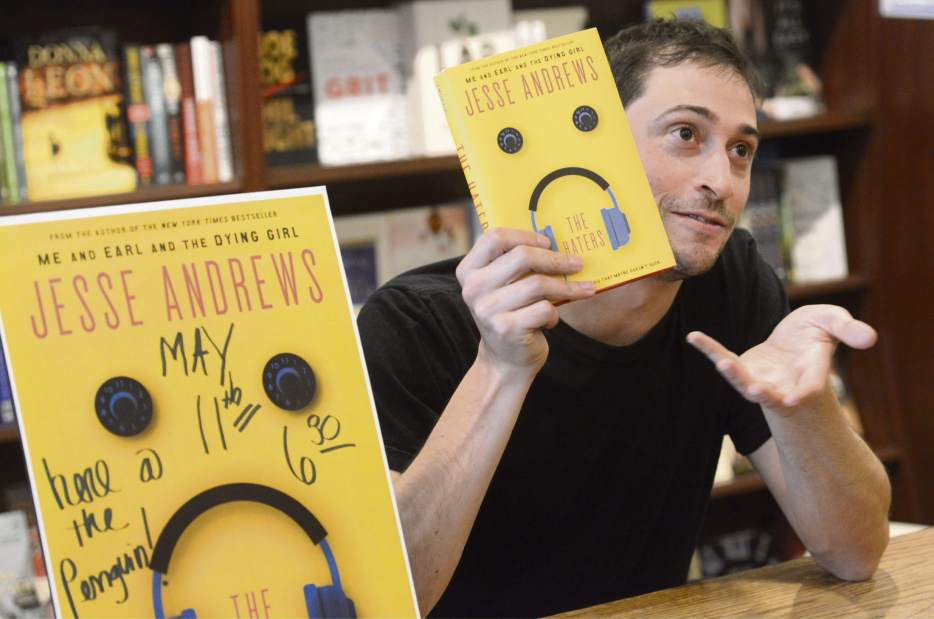Author Jesse Andrews takes comfort in 3s with latest book
Three is a good number for Jesse Andrews.
The Point Breeze native's debut novel, “Me and Earl and the Dying Girl,” features three central characters. His new young-adult title, “The Haters,” features a trio of young musicians who embark on a tour after leaving a jazz camp. Andrews is the middle child of three, and a novelist and screenwriter who is scheduled to add the title of film director to his resume later this year.
“It's a nice number because three is a triangle,” Andrews said before a recent appearance at the Penguin Bookshop in Sewickley to promote “The Haters” (Abrams, $18.95). “And a triangle is inherently kind of unstable. So you usually have two (characters) ganging up on a third, in lots of different ways. … Four is just a lot to write about. Maybe one day I'll be more ambitious and work a fourth person in there.”
Andrews' inclination toward self-deprecation belies his accomplishments. “Me, Earl and the Dying Girl” gave him standing as an accomplished and talented writer, but it was the film version of the young-adult book, which won Grand Jury and Audience awards at the Sundance Film Festival in 2015, that gave him quasi-celebrity status.
Not bad for the Schenley High School graduate (Class of 2000) who came from a family that lacked an ingredient that often inspires writers.
“The only problem with (my family) was it wasn't terribly dysfunctional, and that's what you need as a writer,” Andrews said. “So I had to manufacture a lot of the dysfunction. I had and continue to have very loving and wonderful parents. It's a funny family, and I have two terrific sisters (Lena and Eve) who are both way funnier than me.”
Andrews — who also wrote the screenplay for “Me and Earl and the Dying Girl” — is scheduled to make his directorial debut later this year on “Empress of Serenity,” starring Bill Hader. Upper St. Clair native Stephen Chbosky, who wrote the book and screenplay for “The Perks of Being a Wallflower” and directed the film, is the producer.
Directing will afford Andrews a third means to express his creativity, and is similar to screenwriting in how it requires teamwork.
“A screenwriter is a collaborator with other artists in a way that an author is not,” he said. “It was so energizing to get to do that (on ‘Me and Earl and the Dying Girl'), but it's a function of the people you get to work with. If you're not lucky to work with wonderful people that you're really fired up about — and there are some of those in the entertainment industry — then it's not necessarily this transcendent, beautiful experience.”
For Andrews, the movie version was inspiring because of relationships he forged with producer Dan Fogelman and director Alfonzo Gomez-Rejon. Fogelman became Andrews' mentor during the screenwriting process, and Gomez-Rejon's careful treatment of the script begat a movie that was “far beyond anything I could make,” Andrews said.
Andrews, who attended Harvard and now lives in Boston, also worked as a receptionist at a youth hostel in Germany and played in bands during and right after college. All of these experiences after he left Pittsburgh enabled him to find the heart of “Me and Earl and the Dying Girl” in the last place he expected to find it.
“Growing up in Pittsburgh, I don't think I ever expected to write about it,” Andrews said. “Growing up here was a wonderful childhood, a wonderful adolescence, wonderful people, and yet the stories I was interested in telling at that time were about this enormous universe outside of Pittsburgh. Then I left Pittsburgh and spent time in parts of that universe and attempted to write about it, and that writing had tons of problems. … That writing was, in important ways, unrooted and not grounded. It was a return to Pittsburgh in my mind that allowed me to make something more specific, to make characters that felt real and who had more observations than the characters I was creating.”
Rege Behe is a Tribune-Review contributing writer.

